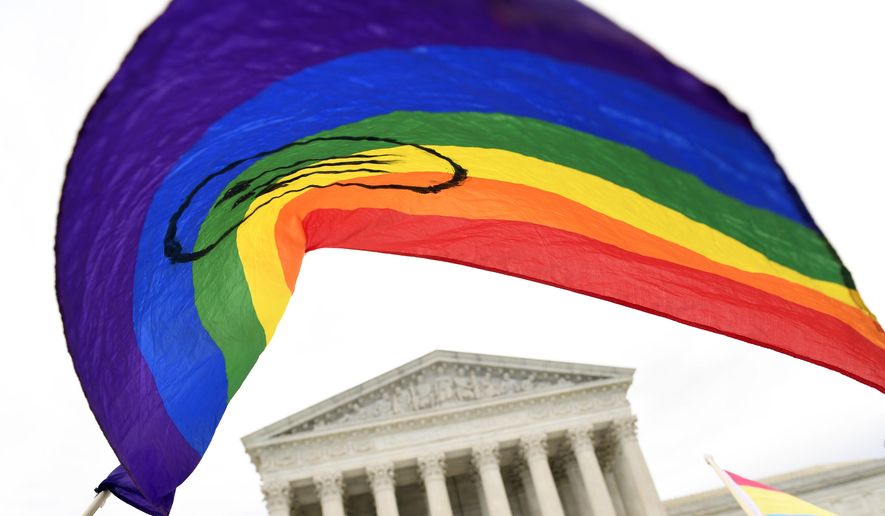Small businesses are bracing for costly new legal battles born of this month’s Supreme Court ruling that expands workplace sex discrimination claims to include gay and transgender employees.
The decision threatens to hit some small businesses with litigation in an area that they haven’t had to deal with until now.
Most big corporations, several of which backed the LGBTQ employees in the legal battle at the high court, already have LGBTQ protections cemented in contracts because they typically operate in multiple states. Nearly two dozen states, the District of Columbia, Guam and Puerto Rico have laws that prohibit sexual orientation and gender identity discrimination in the workplace.
Major companies such as Amazon, AT&T, Bank of America, American Airlines, American Express, CVS and Coca-Cola filed a brief with the high court arguing on behalf of the employees.
“When workplaces are free from discrimination against LGBT employees, everyone can do their best work, with substantial benefits for both employers and employees,” they said.
Robert Tuttle, a law professor at George Washington University, said the big national companies likely would have faced public relations problems if they hadn’t lobbied on behalf of the LGBTQ employees.
“The market pressure that would be placed on them would be enormous,” he said. “I would have been surprised to see too many employers with recognizable names line up in support of the government policy,” Mr. Tuttle said.
Ilya Shapiro, director of the Cato Institute’s Center for Constitutional Studies, said large companies aren’t concerned about increasing litigation.
“One more regulation is just the cost of doing business,” he said.
National companies have large human resources departments, compliance policies and budget lines for the associated costs, but small businesses in states where gay or transgender employees have not been protected might not be ready for lawsuits claiming hiring discrimination.
The landmark legal battle that rewrote Title VII of the Civil Rights Act of 1964, which previously limited sex discrimination to matters of biological sex, involved a trio of lawsuits.
One was brought by a county employee in Georgia, Gerald Bostock, who was fired after he began playing in a gay softball league. Donald Zarda, a skydiving instructor, filed a lawsuit in New York after he was fired for mentioning he was gay. Aimee Stephens was fired from a funeral home in Michigan after she decided to begin presenting herself as a woman instead of as a man, as she did when she was hired.
Zarda died in 2014 in a wingsuit accident, and Stephens recently succumbed to kidney failure. Their families continued to defend their cases through the courts.
The Supreme Court decision is viewed as a major victory for more than 8 million LGBTQ employees in the U.S.
LGBTQ workers were protected during the Obama administration, which had the Equal Employment Opportunity Commission interpret civil rights laws to include discrimination against gay and transgender people in the workplace.
The Trump administration reversed course to strictly follow Title VII.
Conservatives have argued that Congress, not the courts, should change the law, but legislative efforts to expand the federal protections for LGBTQ workers have failed.
The high court ruling left several unanswered questions about how the ruling could affect other legal conflicts moving through the courts.
Justice Samuel A. Alito Jr. disagreed with the decision. In a dissenting opinion, he wrote that the majority of the court overlooked how the pro-LGBTQ civil rights ruling could affect legal battles over locker room and bathroom policies, health care benefits, housing rules and women’s sports.
Just one week after the decision was handed down, the LGBTQ advocacy legal organization Lambda Legal filed a lawsuit against the Department of Health and Human Services for a proposed rule that would overturn the Affordable Care Act’s requirement that health care providers and insurance companies not discriminate against LGBTQ patients who are making medical decisions, such as gender-affirming care.
Josh Blackman, a professor at South Texas College of Law, said the high court’s decision will open a floodgate of lawsuits against federal laws and administration policies.
“The Affordable Care Act prohibits ’sex’ discrimination. Religious hospitals will now be required to perform certain procedures for transgender patients. In addition, various challenges to sex-separated athletics and sex-separated bathroom policies will now proceed,” he said.
• Alex Swoyer can be reached at aswoyer@washingtontimes.com.




Please read our comment policy before commenting.